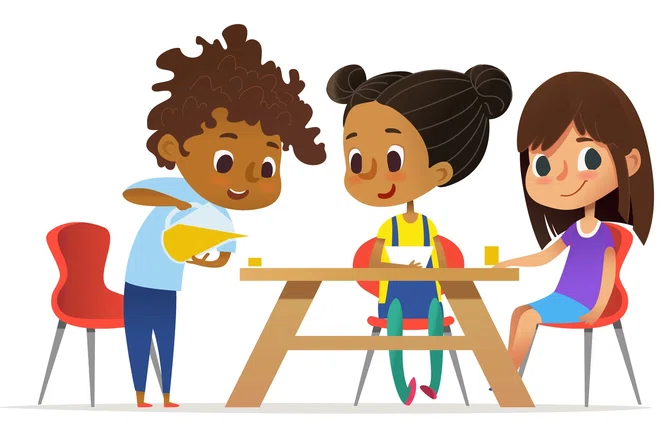Find us on
Association of Washington School Principals
Washington Principal | Volume 2– 2021-22

Breakfast After the Bell in 2022
Opportunity for positive and equitable educational, behavioral, and health outcomes
Madeleine Vistica
K-12 School Meals Coordinator, United Way of King County
Evaluation Criteria: Creating a Culture, Improving Instruction, Managing Resources, Engaging Families & Communities, Closing the Gap
School breakfast is a powerful resource that can re-shape the learning environment and bring positive and equitable educational, behavioral, and health outcomes to students.
We know that 1 in 5 Washington kids struggled with hunger prior to COVID-19[i]. The pandemic has exacerbated food insecurity, disproportionately impacting households of color. However Washington continues to rank among the lowest states for participation in the School Breakfast Program. Breakfast After the Bell (BAB) is an approach to breakfast service in which mealtime is integrated into the instructional day. It is the nationally recognized best practice for increasing participation in school breakfast, making breakfast a part of all students’ routines to minimize stigma and ensure that kids don’t skip breakfast when morning schedules get hectic.
The Washington Kids Ready to Learn Act requires that schools with 70% or more students eligible for free or reduced-price meals serve BAB. (See impacted schools here.) Following pandemic-related delays, the mandate will be in effect for the start of the 2022-23 school year, meaning hundreds of Washington schools will implement BAB in the upcoming months. Many additional schools are opting to implement as well, in order to better support their students, teachers, and families.
Here’s what you need to know about Breakfast After the Bell in Washington, and what that means for your school.
Is Breakfast After the Bell a good fit for my school?
BAB is for every school! Eating breakfast improves students’ concentration, comprehension, memory, and learning.[ii] Breakfast eaters attend more school, score higher in standardized testing, and are 20% more likely to graduate.[iii] With BAB, tardiness is reduced, disruptive behaviors decline, and office referrals become rare in the first part of the day. These benefits are seen in Washington schools of all sizes, locations, and demographics.

BAB is for every school! Eating breakfast improves students’ concentration, comprehension, memory, and learning.[ii] Breakfast eaters attend more school, score higher in standardized testing, and are 20% more likely to graduate.
In Spokane’s West Valley School District, Nutrition Services Supervisor Kara Carlson noted pandemic-related logistics made it easier to serve BAB than before-school breakfast. “Our district has a high percentage of free and reduced students... Serving breakfast in the classroom has increased access to food for all students and increased participation.” She shares, “Overall it has been a great program. Principals and teachers have been very happy with it.”
Olga Manos, principal of Downing Elementary in Tacoma, values the leadership opportunities the program provides, explaining that students deliver and set-up breakfast for their younger peers. She describes how one student, previously a “frequent flier” in her office, rose to the occasion as a breakfast leader. “It has definitely [had a positive impact on] his behavior,” she shares. “[It’s] amazing [to see him] motivated by [recognition] for good actions.” While Downing Elementary is not mandated (about 50% of students qualify for free or reduced-price meals), Tacoma Public Schools has opted to serve BAB district-wide, which Manos says hugely benefits her students. She and her teachers “love that kids are having food to start the day.”
What do I need to know about Breakfast After the Bell in 2022?
The Timeline
Washington schools will be implementing BAB programs in the upcoming months to effectively and safely maximize the impact of school breakfast. Schools impacted by legislation must implement BAB no later than the start of the 2022-23 school year.
Where to Start
United Way of King County has partnered with OSPI to support districts in crafting their BAB plans, and can offer technical assistance, educational resources, funding, and additional implementation support for your program. Access United Way’s Principal Resource Packet at WashingtonBreakfast.org for more information, or reach out to SchoolBreakfast@uwkc.org.
Inquire with your Nutrition Director for information about any active planning for BAB in your district. You may also consult with them around getting a head start on BAB by launching a pilot program this spring.
Hundreds of Washington schools will be operating BAB by next fall, and their students, families, and teachers will experience all of its benefits – your school can too! Breakfast After the Bell is a vital tool for combating childhood hunger and ensuring all Washington children can start each day full, focused, and ready to learn.
Schools have increasingly become a hub of trusted connection for resources to address student hunger and other social needs. Kaiser Permanente, AWSP’s Wellness Champion, is proud to support the whole health of school communities with funding for United Way of King County's ongoing technical assistance and consultation to schools across Washington seeking to implement BAB and Community Eligibility Provision. ■
[i] Analysis of hunger data from the United States Department of Agriculture, the U.S. Census Bureau, and the Brookings Institution. For more information, contact cfelling@strength.org.
[ii] Research Brief: Breakfast for Learning, Food Research & Action Center, 2011.
[iii] No Kid Hungry Starts With Breakfast, Share Our Strength, 2015.


